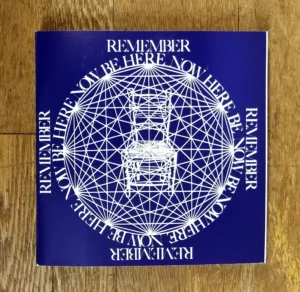 My plan for this week was to write about efficiency and time management. For grins, I did a quick amazon search for books on those topics and was amazed at the number of titles. More than I’d ever have the time or desire to read, for sure.
My plan for this week was to write about efficiency and time management. For grins, I did a quick amazon search for books on those topics and was amazed at the number of titles. More than I’d ever have the time or desire to read, for sure.
But getting a lot of stuff done as quickly as possible isn’t actually what this column is about. Instead, it’s a follow-up to last week’s musings about the pitfalls of multitasking. It’s about doing one thing at a time, slowly and deliberately. About accepting that tasks take however long as they take. About mindfully paying attention to the present.
In other words, being here now.
Which happens to be almost the title of a book that’s been one of my favorite cult classics for a long, long time. “Be Here Now” by Baba Ram Dass is a unique and fascinating read. For starters, it’s shaped like a square. More than half its pages are rough brown paper, the kind old-timey grocery bags were made of. The book is filled with weirdly beautiful drawings. And lots of wisdom.
It has sold more than eight million copies since its publication in 1971.
Baba Ram Dass, known in the early decades of his life as Richard Alpert, was born in 1931. In the 1960s, as a renowned professor at Harvard University, Alpert and fellow professor Timothy Leary—along with a handful of theology students–began experimenting with psychedelic drugs, including psilocybin and LSD. Alpert lost his job, went to India, studied with a guru and changed his name. He then returned to the United States and launched the “mindfulness revolution,” eventually becoming the pre-eminent seeker of the twentieth century. He passed away in 2019.
Flash forward to last year, when I discovered the perfect companion to “Be Here Now,” though on the surface the books are nothing alike. ‘’Four Thousand Weeks: Time Management for Mortals” by Oliver Burkeman was published in 2021, fifty years after Ram Dass’s book. It’s rectangular in shape. Its pages are plain white. There are no pictures.
But this book is filled with wisdom, too. The title comes from Burkeman’s astute revelation that a person who lives 80 years, which is obviously not guaranteed, has only about 4,000 weeks to get everything done. “Getting things done” is exactly his point. That’s not, he contends, why we’re put on this earth. We’re not born to create daily to-do lists and then robotically check tasks off as we complete them. We’re born, instead, to embrace our finitude. To build for ourselves a meaningful life. To concentrate on the things that matter and neglect or ignore the things that don’t.
Pretty much the same things Ram Dass said.
Burkeman maintains that productivity has become a trap in our modern culture. We seek the perfect morning routine. We spend Saturday cleaning house. We cook a week’s worth of meals on Sunday evening. We organize tasks into A, B and C categories. And we fail to acknowledge that the day when we have everything under control will never arrive. We forget that time is our scarcest and most precious resource.
I’m trying to take Oliver Burkeman’s and Ram Dass’s lessons to heart, which doesn’t just mean checking that I’m wearing both hearing aids before I leave the house. It means taking pleasure in simple things done one at a time: dumping ice into the bin and filling and returning the trays to the freezer shelf. Sweeping the porch. Folding the laundry. Throwing the tennis ball to the dog over and over again, and allowing her to amble and explore for a few minutes before we set off on our power walk.
I heard somewhere that a dog sniffing the ground can be compared to a person reading good books. If that’s true, I can only only assume that Kamala is enjoying “Be Here Now” and “Four Thousand Weeks” as much as I did.
(Jennie Ivey is a Cookeville writer. Her email is [email protected])